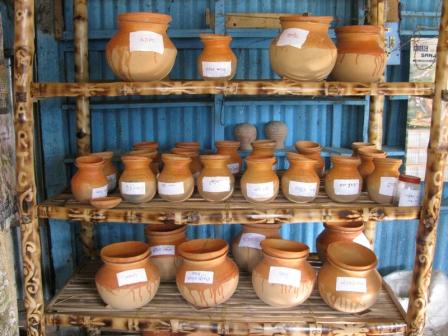gencap
Gender and Climate Adaptation Policy
Making climate and development policies more gender responsive
Home > Policy & Practices > Climate-resilient seeds and women's traditional knowledge
Climate-resilient seeds and women's traditional knowledge
Practice

Uttar Pradesh: In the eastern districts of Gorakhpur, climate change impacts have delayed rains, which now often come when the paddy is ripe for harvesting or has just been harvested in September-October. To adapt to this, Gorakhpur Environmental Action Group (GEAG) has been propagating Saatha, a traditional variety of paddy that matures early, or in 60 days (the number 60 is called ‘saath’ in Hindi). It also grows well in mixed cropping along with jute and traditional coarse cereals or millets. In this mixed cropping, rice is harvested first, then, bajra millet and post-flood jute is harvested. Later on, the winter crop, or rabi is sown.
Saatha is well suited for small and marginal farmers as it adapts well to climate change impacts. The variety requires minimal inputs. It is a rainfed crop and if rains fail, it requires just one or two irrigation unlike the conventional high-yielding paddy varieties. It grows well with bio-inputs and chemical fertilizers in fact restrict the formation of paddy grains. It is also free of pest attacks so does not need any investment in pesticides. Even weeding is done just once. After the harvest, the stalks are given as compensation instead of cash payment to agricultural wage labourers as they prefer to use these for their hut roofs.
Ultimately this variety has a high cultural value and is in demand for chhatt, a popular festival, held at the time of its harvest. Though the yield is not very high, it withstands delayed rains and ensures food security during the flood season.
From a Gender Lens
Promoting and conserving traditional seeds has undoubtedly enhanced food security for both men and women. This option is preferred by villagers to the high-yielding varieties given by government outlets because traditional seeds survive saline waters better and the crop waste can be used as fodder and fuel by women. High-yielding varieties do not yield usable byproducts. Traditional varieties require less labour by women in terms of less weeding. It also enables them to do multi-cropping, especially grow local millets which are hardy and nutritious. The bajra millet harvested after saatha provides fodder.
It gives women an opportunity to save their seeds, instead of buying them from the market, a task which is done by their men and all decisions regarding seeds is then predominantly with men. Women are able to exchange traditional seeds, keep the healthy ones and reclaim their traditional knowledge. Growing these varieties also fulfills their cultural needs.
Policy Options
Both the scientific technologies and the adaptive knowledge from the field need an exchange from laboratories to farms and vice versa.
Knowledgeable and willing farmers, especially women need extension support and be taken in as trainers. Local variety seeds are not available at all in government stores. Government should promote and make available traditional seed varieties, vermincompost, neem paste, etc from government shops and through the Panchayats, block-level offices and agricultural extension workers.
Further Reading
1. Resource organisations: GEAG (http://www.geagindia.org/) and DRCSC (www.drcsc.org)

